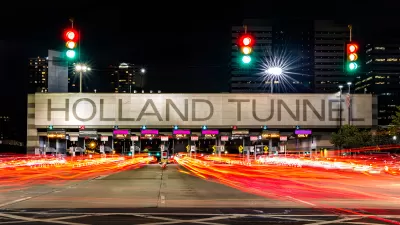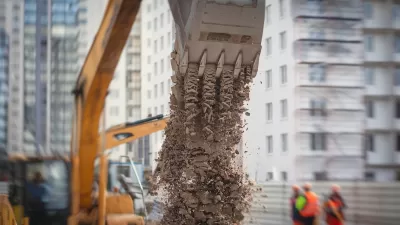As New York City’s congestion pricing program gets closer to implementation, a proposed pricing scheme would charge $15 at peak traffic hours.

A proposed pricing scheme for New York City’s congestion pricing program could put peak-hour tolls at $15, weekend tolls at $9, and off-peak tolls at $3, writes Dave Colon in Streetsblog NYC.
The plan was developed by Charles Komanoff and Gernot Wagner, who say “A $15 peak toll to enter the Central Business District would be more politically palatable than the $23 maximum fee floated in the MTA's official environmental review of the program.”
“The Komanoff/Wagner plan doesn't conform to any of the scenarios that the MTA modeled for the federal government in its environmental assessment, but seeks to charge drivers based on the impact of their trips on traffic — hence the lower toll at night when traffic is negligible, the pair said.” The study authors also recommend rejecting all requests for exemptions, but support rebates for certain tunnels, which drop drivers directly into the congestion zone.
In a statement emailed to Planetizen before the pricing plan was announced, Samara Karasyk, president of the Hudson Square Business Improvement District, said her organization supports congestion pricing. According to Karasyk, “Traffic headed to the Holland Tunnel is a part of daily life in Hudson Square, but the creative use of public spaces and temporary solutions, like open streets, have made our neighborhood safer and more enjoyable for pedestrians. Implementing a permanent congestion pricing program that will reduce traffic in Hudson Square and other parts of our downtown is key to creating neighborhoods where people want to live, work, and visit.”
FULL STORY: Is A $15 Toll The ‘Political Sweet Spot’ for Congestion Pricing?

Study: Maui’s Plan to Convert Vacation Rentals to Long-Term Housing Could Cause Nearly $1 Billion Economic Loss
The plan would reduce visitor accommodation by 25,% resulting in 1,900 jobs lost.

North Texas Transit Leaders Tout Benefits of TOD for Growing Region
At a summit focused on transit-oriented development, policymakers discussed how North Texas’ expanded light rail system can serve as a tool for economic growth.

Using Old Oil and Gas Wells for Green Energy Storage
Penn State researchers have found that repurposing abandoned oil and gas wells for geothermal-assisted compressed-air energy storage can boost efficiency, reduce environmental risks, and support clean energy and job transitions.

Santa Barbara Could Build Housing on County Land
County supervisors moved forward a proposal to build workforce housing on two county-owned parcels.

San Mateo Formally Opposes Freeway Project
The city council will send a letter to Caltrans urging the agency to reconsider a plan to expand the 101 through the city of San Mateo.

A Bronx Community Fights to Have its Voice Heard
After organizing and giving input for decades, the community around the Kingsbridge Armory might actually see it redeveloped — and they want to continue to have a say in how it goes.
Urban Design for Planners 1: Software Tools
This six-course series explores essential urban design concepts using open source software and equips planners with the tools they need to participate fully in the urban design process.
Planning for Universal Design
Learn the tools for implementing Universal Design in planning regulations.
Ascent Environmental
Borough of Carlisle
Institute for Housing and Urban Development Studies (IHS)
City of Grandview
Harvard GSD Executive Education
Toledo-Lucas County Plan Commissions
Salt Lake City
NYU Wagner Graduate School of Public Service





























